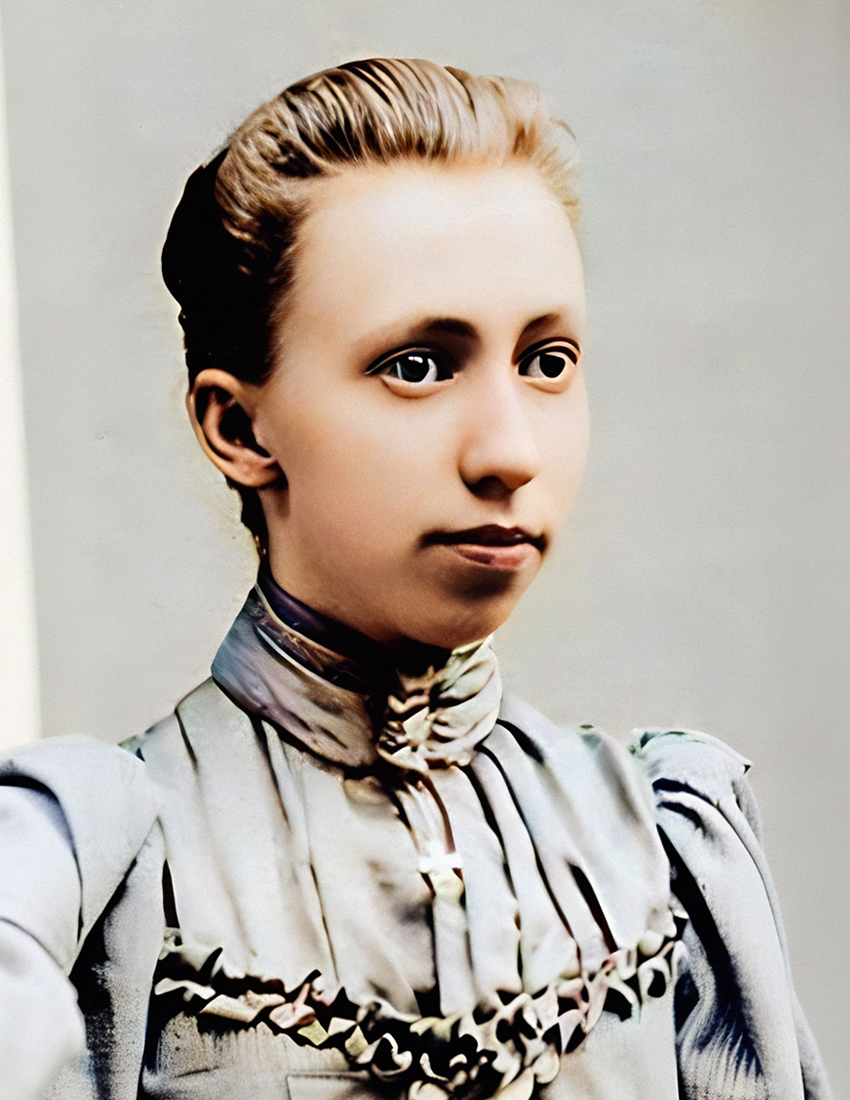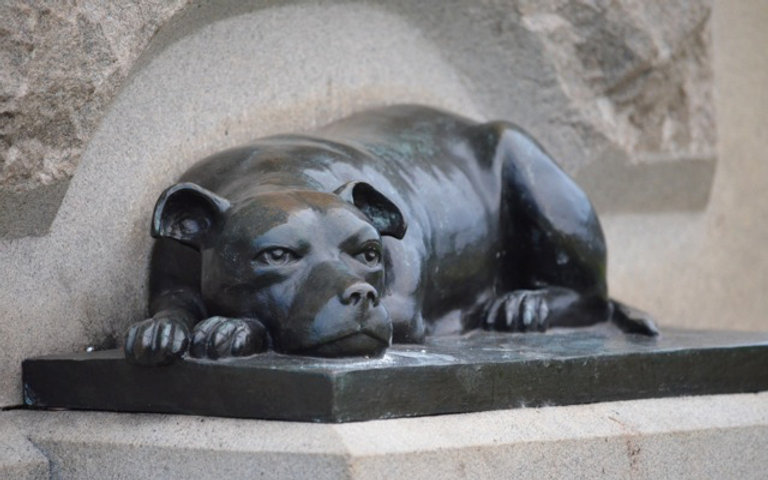Born: February 8, 1874, Henniker, NH.
Died: September 5, 1958, Concord, NH.
Buried: Quaker Cemetery, Henniker, NH.
Jennie Evelyn Hussey

Hymns by Jennie Hussey
Jennie Hussey’s Tribute to Sallie: The War Dog
Among Jennie Hussey’s lesser-known works is a touching poem titled “The War Dog.” This piece tells the true story of Sallie, a brave bull terrier who became the mascot of the 11th Pennsylvania Volunteer Infantry during the Civil War.
Sallie’s tale is one of unwavering loyalty and courage. When her original master fell in battle, she refused to leave his side, standing guard over his body amidst the chaos of war. Moved by her devotion, the 11th Regiment adopted her as their own.
This canine soldier marched alongside her comrades, licked their wounds at Gettysburg, and even survived being shot at South Mountain. In a humorous twist that speaks to her dedication, Sallie gave birth to pups four times during the war, but would be back on the march the very next day, leaving the quartermaster to care for her litter!
Hussey’s poem captures the spirit of this remarkable dog:
Sallie was a lady,
She was a soldier too
She marched beside the colors,
Our own red white and blue
It was in the days of our Civil War
That she lived her life so true.
Tragically, Sallie was killed in action at Hatcher’s Run in 1865, just months before the war’s end. Today, a bronze statue of Sallie stands guard at the 11th Pennsylvania’s monument in Gettysburg National Military Park, a lasting tribute to a dog who embodied the loyalty and sacrifice of her human counterparts.
Jennie E. Hussey: A Life of Grace Amidst Adversity
A gentle breeze rustles through the leaves of an old elm tree, carrying with it the sweet scent of lilacs. Nearby, a woman sits in her chair, her gnarled fingers carefully arranging words on a page. This is Jennie Evelyn Hussey, a poet whose life was marked by both profound challenges and extraordinary grace.
What inner strength allows a person to create beauty while facing constant pain? How does one find the courage to care for others when one’s own body is failing? Jennie Hussey’s story exemplifies the power of faith, creativity, and unwavering dedication in the face of adversity.
Roots in Quaker Soil
Born on February 8, 1874, in Henniker, New Hampshire, Jennie was the fourth generation of her Quaker family to call their farmhouse home. The simplicity and deep spirituality of her Quaker upbringing would shape her worldview and infuse her writing with a quiet, powerful faith.
A Blossoming Talent
Jennie’s gift for words manifested early. At the age of eight, she began penning verses, her young mind already attuned to the rhythms of language. By thirteen, her work found its way into print, marking the beginning of a lifelong literary journey.
Answering the Call to Care
As Jennie entered adulthood, she faced a profound challenge. Her sister became an invalid, requiring constant care. Without hesitation, Jennie took on this responsibility, embodying the selflessness she would later express in her most famous hymn, “Lead Me to Calvary.”
Creating Beauty Amidst Pain
Even as rheumatism began to twist her fingers and limit her mobility, Jennie’s creative spirit remained undiminished. She continued to write, producing over 150 hymns and numerous poems. Her work reflected both her deep faith and her love for the natural world that surrounded her New Hampshire home.
“Lead Me to Calvary”
In 1921, during Passion Week, Jennie penned the words that would become her most enduring legacy. “King of my life, I crown Thee now” captured the essence of her faith – a desire to remember Christ’s sacrifice and to live a life of devotion. The hymn’s first verse and chorus read:
King of my life, I crown Thee now,
Thine shall the glory be;
Lest I forget Thy thorn-crowned brow,
Lead me to Calvary.Lest I forget Gethsemane,
Lest I forget Thine agony;
Lest I forget Thy love for me,
Lead me to Calvary.
A Window to the World
Despite her physical limitations, Jennie’s world remained rich and vibrant. In a letter to a friend, she painted a vivid picture of her daily life:
“You might find me in a wooded valley at the foot of Mount Hunger, feeding a company of gray squirrels that come to the trees and scramble over my windows, while blue jays call their companions to share the food I scatter for them.”
Her love for nature and her ability to find joy in small moments shone through her words, inspiring others to look for beauty in their own lives.
A Legacy of Faith and Fortitude
Jennie Evelyn Hussey’s life took an unexpected turn in her later years. Hymnologist Ann Divine provides insight into a poignant moment:
“When in her later years Jenny (sic) Evelyn Hussey asked to be baptized, she explained to the minister that she had been hidden away in the country most of her life and before she died, she wanted others to know that she loved Jesus.
This request, coming from a woman of Quaker heritage where outward sacraments were not practiced, speaks volumes about Hussey’s deep, personal faith. Divine further illuminates the depth of Hussey’s character:
Never complaining, she too was later stricken with deforming arthritis. What an irony that this self-sacrificing woman, who accepted her anonymity with quiet grace, should be remembered through this her hymn.”
In light of these circumstances, the fourth verse of “Lead Me to Calvary” takes on new significance:
May I be willing, Lord, to bear
Daily my cross for Thee;
Even Thy cup of grief to share,
Thou hast borne all for me.
Jennie Evelyn Hussey passed away on September 5, 1958, in Concord, New Hampshire. She was laid to rest in the Quaker graveyard in Henniker, returning to the land that had nurtured her throughout her life.
Her legacy lives on not only in her hymns and poems but in the example she set. Jennie’s life reminds us that even in the face of physical pain and limitation, one can create beauty, inspire others, and live a life of profound meaning and service.
As we reflect on Jennie Hussey’s journey, we’re challenged to consider our own response to life’s difficulties. What beauty might we create, what service might we offer, if we approached our challenges with Jennie’s grace and unwavering faith?


